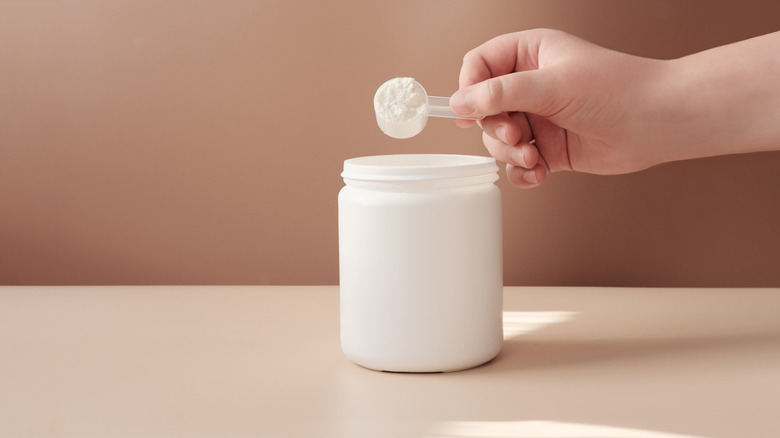Is Collagen Safe During Pregnancy?
Collagen is a protein that is naturally produced in the body and helps to build skin, hair, bones, muscles, tendons, and ligaments (via Everyday Health). Collagen supplements are very popular for their ability to improve skin elasticity, reduce wrinkles, relieve joint pain, and more (via Healthline). If you've been regularly taking a collagen supplement and recently became pregnant, you may be wondering if you need to change your habits.
According to Mindbodygreen, you should always consult your doctor before taking any supplements while pregnant. Your health may differ from someone else's and no advice is universal. That being said, many people should be able to take collagen while they are pregnant without any issues. "It's protein in its basic form, so there shouldn't be any reason why pregnant people can't take it," said OB-GYN Wendie Trubow, MD, MBA. A collagen supplement should have similar effects as eating fish, poultry, and meat while pregnant, as these products contain collagen naturally.
Side effects of taking collagen
Whether you're pregnant or not, it's important to know the potential side effects of taking a collagen supplement. Collagen is usually found in powder form, which means you can taste the flavor of it more strongly than supplements that come in pills or capsules (Livestrong). It can have a funky flavor that you might not enjoy. However, you can avoid leaving a bad taste in your mouth by buying high-quality collagen powder and mixing it with flavored beverages like juice or sparkling water.
If you're allergic to fish, shellfish, or eggs, you may want to be concerned about a possible allergic reaction. Collagen can be made with some or all of these products, so people who are allergic to them should avoid the supplement or speak with their doctor to find a safer alternative. Finally, collagen may cause digestive upset in some people. "Some people may feel mild bloating or heaviness in their stomach," Dr. Stacy Chimento M.D., a board-certified dermatologist at Riverchase Dermatology, told Bustle. Some proteins, including collagen, can be difficult for the body to digest.


